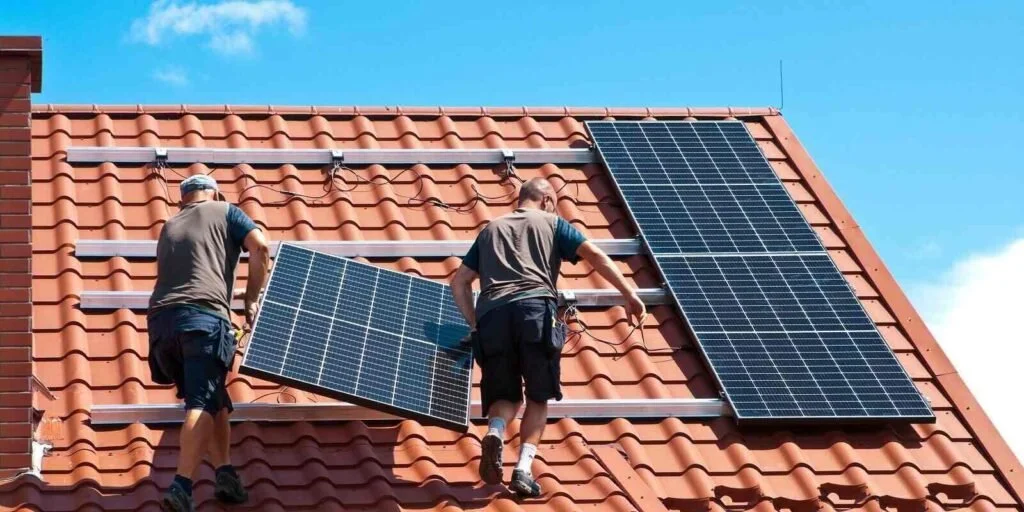Complete Guide to Residential Solar Permitting in Washington D.C.: Requirements, Process, and Timelines
Installing solar panels on your Washington D.C. home can significantly reduce energy costs while contributing to the city's renewable energy goals. However, the permitting process involves multiple agencies and specific requirements that vary depending on your property's location and characteristics. This comprehensive guide walks you through every step of obtaining solar permits in the District, from initial planning to final approval.
Understanding D.C.'s Solar Regulatory Framework
Washington D.C. has established a streamlined solar permitting process to encourage renewable energy adoption while maintaining safety standards and preserving neighborhood character. The city's solar-friendly policies include expedited reviews, online applications, and specific guidelines for historic properties.
Key Regulatory Agencies
Department of Consumer and Regulatory Affairs (DCRA):
Issues electrical and building permits
Conducts safety inspections
Manages online permitting system
Historic Preservation Review Board (HPRB):
Reviews solar installations in historic districts
Issues certificates of appropriateness for historic properties
Pepco (Potomac Electric Power Company):
Handles interconnection agreements
Manages net metering applications
Conducts utility inspections
Department of Energy and Environment (DOEE):
Administers solar incentive programs
Provides renewable energy certificates
Step-by-Step Solar Permitting Process
Step 1: System Design and Site Assessment (2-4 weeks)
Before applying for permits, complete a thorough site assessment and system design.
Professional requirements:
Licensed solar installer or electrical contractor
Structural engineer assessment (for older buildings or complex installations)
Historic preservation consultant (for historic district properties)
Key design considerations:
Roof condition and structural capacity
Electrical panel capacity and upgrade needs
Shading analysis and optimal panel placement
Historic district compatibility requirements
Setback requirements from roof edges
Required documentation:
Site survey and roof measurements
Electrical load analysis
Structural calculations (if required)
Equipment specifications and cut sheets
Single-line electrical diagram
Step 2: Historic District Review (if applicable) (4-8 weeks)
Properties in D.C.'s historic districts require HPRB approval before DCRA will issue permits.
Historic districts requiring review:
Capitol Hill Historic District
Georgetown Historic District
Dupont Circle Historic District
Mount Pleasant Historic District
LeDroit Park Historic District
Takoma Park Historic District
HPRB application requirements:
Completed application form (HPRB-001)
Site plan showing panel placement
Elevation drawings showing visibility from public streets
Photographs of existing roof and surrounding context
Equipment specifications and mounting details
HPRB review criteria:
Visibility from public streets and alleys
Impact on building's historic character
Compatibility with neighborhood context
Reversibility of installation
Quality of equipment and installation design
Fees:
Application fee: $100-$200 (based on project scope)
Expedited review: Additional $200 (reduces timeline by 2 weeks)
Timeline: 6-8 weeks for standard review, 4-6 weeks for expedited
Step 3: Building and Electrical Permit Application (1-3 weeks)
Submit permit applications to DCRA through their online portal or in person.
Required permits:
Electrical permit (always required)
Building permit (required for roof-mounted systems)
Public space permit (if equipment affects public areas)
Application documents:
Completed permit applications (DCRA-ELE-001 and DCRA-BLD-001)
System design plans and specifications
Structural calculations (for systems over 10kW or on older buildings)
Equipment cut sheets and certifications
Site plan and roof layout
Single-line electrical diagram
HPRB approval letter (if applicable)
Fees:
Electrical permit: $50-$150 (based on system size)
Building permit: $100-$300 (based on system value)
Plan review: $75-$200
Expedited review: Additional $200 per permit
Online submission: dcra.dc.gov
In-person submission: 1100 4th Street SW, Suite E200
Step 4: Pepco Interconnection Application (2-6 weeks)
Apply for grid interconnection and net metering simultaneously with permit applications.
Required forms:
Interconnection Application (Form 2848)
Net Metering Application
Electrical single-line diagram
Equipment specifications
Proof of insurance
Application process:
Submit online at pepco.com
Pepco reviews application for grid compatibility
Receive interconnection agreement
Sign and return agreement with required fees
Fees:
Application fee: $100
Study fees: $0-$500 (for systems under 25kW, typically no additional studies required)
Timeline: 2-4 weeks for systems under 10kW, 4-6 weeks for larger systems
Step 5: Permit Approval and Construction (1-2 weeks approval, varies for construction)
Once DCRA approves your permits, construction can begin.
Permit approval timeline:
Standard review: 10-15 business days
Expedited review: 5-7 business days
Over-the-counter approval: Same day (for simple installations meeting specific criteria)
Construction requirements:
Work must be performed by licensed electrical contractor
All work must comply with approved plans
Required inspections must be scheduled and passed
Step 6: Inspections (1-3 weeks)
D.C. requires multiple inspections throughout the installation process.
Required inspections:
Rough electrical inspection (before panels are installed)
Final electrical inspection (after system completion)
Building inspection (if structural work performed)
Pepco witness test (utility inspection)
Scheduling inspections:
Online: dcra.dc.gov
Phone: (202) 442-9557
Required: 24-48 hours advance notice
Common inspection issues:
Improper grounding and bonding
Inadequate equipment labeling
Non-compliant electrical connections
Missing required disconnects
Step 7: Permission to Operate (1-2 weeks)
After passing all inspections, obtain final approvals to activate your system.
Final steps:
Submit inspection certificates to Pepco
Receive Permission to Operate (PTO) from Pepco
Activate net metering agreement
Register system with DOEE for incentives
D.C.-Specific Requirements and Regulations
Historic District Considerations
Design requirements for historic properties:
Panels should be placed on rear roof slopes when possible
Minimize visibility from public streets
Use black or dark-colored panels and mounting systems
Maintain consistent panel layout and alignment
Avoid installations on primary facades
Acceptable installation types:
Roof-mounted systems on non-visible roof areas
Ground-mounted systems in rear yards (with screening)
Solar canopies over parking areas (with appropriate design)
Generally unacceptable:
Panels visible from primary public street frontages
Installations that damage historic roofing materials
Ground-mounted systems visible from public areas
Installations requiring removal of historic architectural features
Structural Requirements
Building code compliance:
Systems must comply with D.C. Building Code
Wind and snow load calculations required
Seismic design considerations for larger systems
Fire setback requirements (3 feet from roof edges and ridges)
Structural assessment required for:
Buildings constructed before 1970
Systems larger than 10kW
Installations on flat roofs requiring ballasted mounting
Buildings with known structural issues
Electrical Code Requirements
National Electrical Code (NEC) compliance:
Rapid shutdown requirements for rooftop systems
Arc fault circuit interrupter (AFCI) protection
Ground fault protection for all systems
Proper equipment grounding and bonding
Required labeling and placarding
D.C.-specific electrical requirements:
Licensed electrical contractor must perform all electrical work
Electrical permit required for all solar installations
Separate production meter may be required for systems over 10kW
Environmental and Safety Considerations
Stormwater management:
Ground-mounted systems may require stormwater permits
Pervious surfaces preferred for large ground installations
Runoff calculations required for systems over certain sizes
Tree preservation:
Avoid removing healthy street trees for solar access
Tree removal permits required for District-owned trees
Consider alternative installation locations to preserve mature trees
Timeline and Cost Summary
Typical Project Timeline
Without historic review:
Design and planning: 2-4 weeks
Permit applications: 1-2 weeks
Permit approval: 1-3 weeks
Installation: 1-3 days
Inspections: 1-2 weeks
PTO approval: 1-2 weeks
Total: 6-12 weeks
With historic review:
Add 6-8 weeks for HPRB review
Total: 12-20 weeks
Permitting Costs
Standard residential system (5-10kW):
DCRA permits: $200-$500
HPRB review (if required): $100-$400
Pepco interconnection: $100
Professional services: $500-$1,500
Total permitting costs: $900-$2,500
Common Challenges and Solutions
Historic District Approvals
Challenge: HPRB rejection due to visibility concerns
Solution: Redesign system placement, consider alternative mounting options, or provide detailed visibility studies
Challenge: Lengthy HPRB review process
Solution: Submit complete applications with detailed drawings and consider expedited review option
Structural Issues
Challenge: Roof cannot support solar system weight
Solution: Structural reinforcement, alternative mounting systems, or ground-mounted installation
Challenge: Older electrical panels inadequate for solar
Solution: Electrical panel upgrade (requires additional permits and costs)
Utility Interconnection Delays
Challenge: Pepco interconnection delays
Solution: Submit complete applications early, maintain communication with utility representatives
Challenge: Net metering agreement complications
Solution: Work with experienced solar installer familiar with Pepco requirements
Incentives and Financial Considerations
Available Incentives
Federal tax credit: 30% of system cost (through 2032)
D.C. solar incentives:
Solar Renewable Energy Credits (SRECs)
Property tax exemption for solar installations
Sales tax exemption on solar equipment
Financing options:
Solar loans through D.C. Green Bank
Property Assessed Clean Energy (PACE) financing
Traditional home equity loans
Return on Investment
Typical payback period: 6-10 years
System lifespan: 25-30 years
Net savings: $15,000-$40,000 over system lifetime
Tips for Success
Choosing the Right Installer
Look for:
D.C. electrical contractor license
Experience with historic district projects
NABCEP certification
Local references and portfolio
Comprehensive warranty offerings
Application Best Practices
Ensure success by:
Submitting complete applications with all required documents
Using experienced professionals familiar with D.C. requirements
Starting historic district review early in the process
Maintaining communication with all reviewing agencies
Planning for potential design modifications
Avoiding Common Mistakes
Don't:
Start installation before receiving all required permits
Assume historic district approval is automatic
Underestimate timeline for complex installations
Skip structural assessment for older buildings
Forget to coordinate with utility interconnection requirements
Conclusion
Installing residential solar in Washington, D.C. requires navigating multiple agencies and requirements, but the process is well-established and increasingly streamlined. The key to success is thorough planning, complete applications, and working with experienced professionals who understand D.C.'s specific requirements.
Historic district properties face additional review requirements, but solar installations are regularly approved when properly designed and presented. The city's commitment to renewable energy, combined with attractive financial incentives, makes the permitting investment worthwhile for most homeowners.
By following this guide and working with qualified professionals, you can successfully navigate D.C.'s solar permitting process and begin generating clean, renewable energy for your home. The upfront effort in obtaining proper permits ensures a safe, legal, and valuable addition to your property that will provide benefits for decades to come.
For complex installations or properties with unique challenges, consider working with a permit expediter who specializes in D.C. solar projects to ensure efficient processing and avoid costly delays.
Get Expert Help Today
Don't let permit confusion delay your project or create costly problems down the road. M.C.G. Permit Consultants has been helping DC homeowners navigate the permit process since the 1980s.
Free Consultation - No Obligation
Call: (202) 729-8272
Email: sayhello@mcgpermits.com
Online: Our Solar Permit Service Page
What You'll Get:
Project evaluation within 4 hours
Clear permit requirements explanation
Timeline and cost estimates
Direct access to owner
Why Choose M.C.G.:
25+ years of DC permit experience
Personal service - work directly with the owner
Established relationships with DCRA and other agencies
Simply Getting it Done - our proven approach
Don't Risk Costly Mistakes - Get Your Free Permit Consultation Today
Whether you're planning a simple bathroom update or a major home addition, we'll help you understand exactly what permits you need and how to get them quickly and correctly.
Contact M.C.G. Permit Consultants:
Simply Getting it Done Since 2000
This guide provides general information and should not replace professional consultation for your specific project. Permit requirements can change, and individual circumstances may require different approaches.

